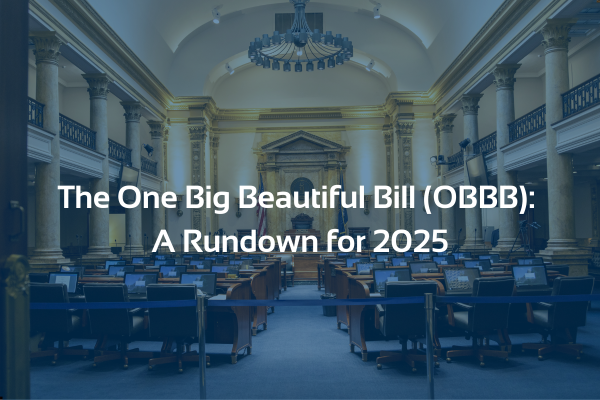
After a tumultuous review by both the House and the Senate, Congress passed the One Big Beautiful Bill (OBBB) on July 3rd, with the President immediately signing it into legislation on the July 4, 2025 holiday. The bill was paramount to enacting several of the campaign promises made by Trump and “fixing” many of the provisions from the Tax Cuts and Jobs Act (TCJA) that were set to sunset after the 2025 tax year.
Below is a summarization of the major changes the bill brings for the 2025 tax year that is already half underway. These will be the most important provisions as current year tax strategies still have time to be adjusted.
Individual Tax Changes for 2025
Limitation on Itemized Deductions:
The OBBB institutes a 35% limitation on itemized deductions for taxpayers in the 37% tax brackets. This is accomplished by reducing by 2/37ths the lesser of (1) the total value of those itemized deductions or (2) the amount of taxable income in excess of the 37% bracket.
Excess Business Losses:
The OBBB permanently extends the Section 461(l) limitation on business losses used to offset nonbusiness income. Such limitation was indexed to inflation and currently equals $313,000 in 2025 ($626,000 for joint filers). The excess business losses are still converted to NOLs under the carryforward rules.
Child Tax Credit:
The OBBB makes the TCJA expansion of the credit permanent and also increases the credit to $2,200 beginning in 2025.
No Tax on Tips:
One of Trump’s campaign promises which the OBBB makes possible through a new deduction of up to $25,000 for qualified tips. The deduction will phase out at a rate of 10% of the individual’s modified adjusted gross income (AGI) that exceeds $150,000 ($300,000 for MFJ). The deduction is fully phased out at $400,000 of modified AGI ($550,000 if MFJ). Qualified tips may only be in industries where tips are a normal occurrence prior to 2025.
The Treasury will provide a list of qualifying occupations within 90 days of the bill’s enactment. This will not be an itemized deduction and is available to employees and independent contractors alike. Employers will be required to include tips on W2s, 1099s, and similar information reports starting with the 2025 tax year.
No Tax on Overtime Pay:
The OBBB provides a similar new above-the-line (non-itemized) deduction of $12,500 ($25,000 for MFJ) for qualified overtime compensation per year. The deduction phases out in the same manner as the tip deduction discussed above. Overtime compensation is defined by the rules in the Fair Labor Standards Act. Qualified overtime compensation will need to be reported separately on an employee’s W2 starting with the 2025 tax year.
Temporary Deduction for Seniors:
This is meant to answer Trump’s campaign promise of no tax on social security benefits. Ultimately, the OBBB landed on a similar deduction mechanism with an income phase-out. Seniors (age 65 or older) will be eligible for an additional deduction of up to $6,000 ($12,000 if both MFJ filers are over 65). The deduction is reduced by 6% of modified AGI in excess of $75,000 ($150,000 for MFJ). Set to sunset in 2028.
Deduction of Car Loan Interest:
Another new non-itemized deduction is for qualifying vehicle loan interest paid from 2025 through 2028. The deduction is capped at $10,000 and will be phased out beginning at $100,000 AGI ($200,000 for MFJ) with full phase out at $150,000 ($250,000 MFJ). This will require a new Form 1098 to be filed by lending institutions similar to home mortgage interest starting in 2025.
The SALT Cap
In one of the most highly contested areas of the bill, the $10,000 SALT cap instituted in the Tax Cuts and Jobs Act (TCJA) was set to expire at the end of the 2025 tax year. Both political parties had an interest in extending or amending this provision through the bill however in largely different ways. Some of the earlier provisions released by the House would have increased the cap but instituted limitations on the reactionary Pass-Through Entity Tax (PTET) provisions that were enacted in response to the TCJA cap. This would have had the effect of limiting the SALT deduction, albeit in a lessor manner, for flow-through entity members only. Ultimately, the Senate removed these flow-through limitations but kept the deduction cap.
For 2025, the SALT cap will increase from $10,000 to $40,000. The increased cap will phase down beginning at $500,000 of modified AGI but not below the original $10,000 cap. The increased cap will be fully phased down to $10,000 for taxpayers with $600,000 or more of modified AGI. There are no other changes to PTET regulations that were put in place from the TCJA.
Business Tax Changes:
Qualified Business Income Deduction (QBID) – The 20% QBID has been retained on a permanent basis while elongating the range of income over which the phase outs occur. It also creates a minimum $400 deduction for certain taxpayers with active business income. No other changes to QBID were enacted.
R&D Expenditures Under Section 174:
The OBBB reinstates the immediate deduction for domestic 174 costs (foreign costs are still capitalized and amortized over 15 years). Under the OBBB, any remaining domestic R&D capitalized in 2022, 2023, or 2024 may be deducted immediately in 2025, or spread evenly between 2025 and 2026. Small taxpayers with gross receipts under $31M will be permitted to amend returns from 2022 through 2024 to remove the capitalization of domestic R&D costs.
100% Bonus Depreciation:
The OBBB brings back the 100% bonus depreciation deduction for property acquired and placed in service after January 19, 2025. This has also been made permanent.
Increased Threshold for 1099 Reporting:
The OBBB increases the stagnant threshold for 1099 reporting from the previous $600 to $2,000 beginning with payments made in 2026 and will index the amount for inflation beginning in 2027.
A more thorough review of the individual and business provisions as well as many that will be effective beginning with the 2026 tax year will be coming soon. Follow MRPR for further updates regarding the One Big Beautiful Bill.
Author:

Meagan Cooke CPA,MST, Senior Manager / QuickBooks ProAdvisor